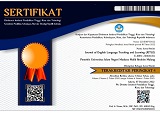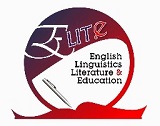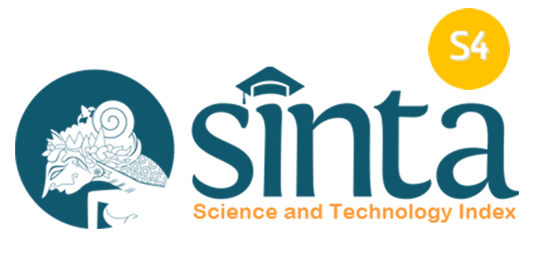- Focus and Scope
- Section Policies
- Peer Review Process
- Publication Frequency
- Open Access Policy
- Archiving
- Screening for Plagiarism
- Review Guidelines
- Revision Guidelines
Focus and Scope
Focus and Scope of JETLe :
Section Policies
Articles
Peer Review Process
The research article submitted to this online journal will be peer-reviewed by two (2) reviewers using a Double-Blind Review system with multiple rounds. Each round involves a reviewer, and a different reviewer might be assigned in the next rounds depending on the case arising. The accepted research articles will be available online after the journal peer-reviewing process is completed.
All submitted manuscripts will first undergo an initial evaluation by the editorial team to ensure compliance with the journal’s scope and ethical standards. Manuscripts passing this stage are then sent to qualified reviewers based on their expertise.
The editors make publication decisions based on the reviewers’ recommendations, considering the manuscript’s originality, clarity, and contribution to the field. The review process is conducted confidentially to maintain objectivity and integrity between authors and reviewers.
All manuscripts are checked for plagiarism using Turnitin before being reviewed.
Publication Frequency
JETLe (Journal of English Language Teaching and Learning) published online twice a year October and April
Open Access Policy
Journal of English Language Teaching and Learning (JETLE) provides immediate open access to its content on the principle that making research freely available to the public supports a greater global exchange of knowledge.
This journal is an open-access journal, meaning that all content is freely available without charge to users or institutions. Users are permitted to read, download, copy, distribute, print, search, or link to the full text of the articles in this journal without asking prior permission from the publisher or author — provided that the original work is properly cited.
All articles are licensed under a Creative Commons Attribution–ShareAlike 4.0 International License (CC BY-SA 4.0), which allows others to remix, adapt, and build upon the work, even for commercial purposes, as long as they credit the author(s) and license their new creations under identical terms.
This policy is in accordance with the principles of the Budapest Open Access Initiative (BOAI), which promotes the free and unrestricted access to scholarly research.
Archiving
This journal utilizes the LOCKSS system to create a distributed archiving system among participating libraries and permits those libraries to create permanent archives of the journal for purposes of preservation and restoration.
The LOCKSS Publisher Manifest page for this journal is available at: https://ejournal.uin-malang.ac.id/index.php/jetle/gateway/lockss
Screening for Plagiarism
Journal of English Language Teaching and Learning (JETLE) strongly opposes plagiarism on its own merits. It is committed to blocking plagiarism, including self-plagiarism.
The author must ensure that they have written the original work fully, and if the author has used the work and/or words of others who have been quoted or quoted correctly. Papers found with such problems are automatically rejected and the authors strongly recommend it. Also, important parts of the work have not been published. The author also respects writing in the Journal of English Language Teaching and Learning (JETLE) from excessive publication, duplicates, or fraud.
Before the author submits the manuscript to the Journal of English Language Teaching and Learning (JETLE) at least to first examine the use of plagiarism. When submitting articles published for authenticity checks,Journal of English Language Teaching and Learning (JETLE) recommends using Turnitin, Scanner from http://turnitin.com/. Before using Turnitin Plagiarism for the first time, we strongly recommend that the writer read the instructions for using this plagiarism detector. The plagiarism detector system for the Journal of English Language Teaching and Learning (JETLE) uses and is affiliated with Turnitin and the minimum requirement is 25% similarity result.
* Please note that the Journal of English Language Teaching and Learning (JETLE) is affiliated with Turnitin. *
The article has never been published in other media and does not contain plagiarism. Authors should use reference management software, for example for Mendeley or Zotero. Bibliography and reference system for the Journal of English Language Teaching and Learning (JETLE) using Mendeley and Zotero
Review Guidelines
General:
1. Put a mark on the wrong part or part that needs to be changed.
2. Put a mark on the right side of the line or the wrong line that needs to be changed.
Details:
1. Title: Effectiveness, Specifications, and clarity.
2. Abstract: Complete and describe the essence of the article.
3. Keywords: Describe important concepts of the article.
4. Introduction: Up-to-date, originality, the relevance of topics, compatibility of important reasons of research objects.
5. Research Methods: Should emphasize procedures and data analysis for empirical studies.
6. Results: Accuracy analysis.
7. Findings: Recent findings, relevance to interrelated researchers, and the contribution of scientific contributions from findings/ideas to the development of science.
8. Conclusion: Logical, valid, concise, and clear.
9. Suggestion: For practical action, the development of new theories, and further/further research.
10. Pictures / Tables: Centrally located, Not cropped, Good quality to see, image/title of the table, referenced in capital letters
11. Bibliography: The latest degrees and references to the main book sources. Rules: minimum 80% of journals or scientific researchers; reference issues maximum of the past 10 years; minimum number of book sources 15; minimum 80% in text/art material.
Complete Manuscript Review Process:
1. Writing: Is the script easy to follow, that is, has a clear logical and organizational development?
2. Is the script concise and easy to understand? Every part that has to be reduced, Removed / expanded / added?
4. Pay attention if there are major problems with mechanics: grammar, punctuation, spelling. (If there are only a few places that aren't properly spoken or correct, make a note to tell the author of certain places. If there are consistent problems throughout, only select one or two examples if necessary - don't try and edit them all).
5. Abbreviations: Used wisely and arranged so that the reader will have no trouble remembering what the abbreviations represent.
6. Follow the style, format, and other journal rules.
7. Quotations are provided when providing evidence-based information from outside sources.
Decision Category:
Publish: No Need for Revision
Minor: Revisions can be made by the Editor-In-Chief or those who help
Major: Revisions can only be made by the author
Rejected: Not scientific or too much
Revision Guidelines
The paper that has received the results of the review is expected to be immediately revised to adjust the suggestions and questions that exist in the review results. The author is given no later than 15 days to revise his paper counted since the submission of the review results. If at that time the author does not upload the revised paper, then the paper will not be refused to be published (reject). Renewal time extensions can be obtained in accordance with strong demand and reason. The revised paper is further uploaded to Journal website and also sent via email http://ejournal.uin-malang.ac.id/index.php/jetle/index
Following the provisions of the revised paper in Journal :
When a reviewer gives comment on paper (in the comment box), the writer asked to directly reply to that comment box. The answer from the author can be Information that has been done revision or reason/argumentation if the author is not willing to revise for some reason (please can be submitted in the comments field already available briefly and details).
Revised on paper or additional material/sentence please block yellow highlighter.
Attached sample of revision process paper in Journal to facilitate revision process by the author.








